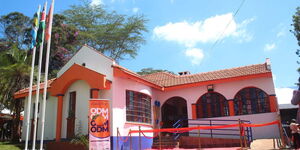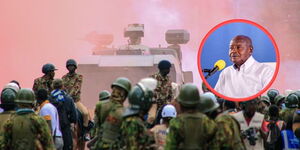Police on Friday night conducted a raid at the Eldoret International Airport arresting three Kenya Revenue Authority (KRA) Officials with a huge consignment of a drug known as Mandrax.
Initial reports indicate that the officials were allegedly trying to sneak in the illegal drugs which they concealed as vitamins.
Officers from the General Service Unit (GSU) were deployed to the airport as reinforcement following a standoff between the KRA officials and police.
The raid conducted was prompted by reports of laxity and collusion between criminals and airport officials that facilitated illegal activities in the facility.
[caption caption="Eldoret International Airport"] [/caption]
[/caption]
Separate reports indicate that officers also conducted a raid at Kasarani, Nairobi, where a man believed to be the kingpin of the drug operation was also nabbed.
Investigations are ongoing as identities of the criminals and the government officials have not been revealed.
On Saturday, The Ministry of Interior spokesperson Mwenda Njoka stated that the value of the 80,298 Mandrax capsules seized yesterday was Kshs35 Million.
"80,000 capsules seized at Eldoret Airport. 100 capsules from the office of the suspected importer at Kasarani and 198 from his residence in Kileleshwa," he conveyed in a statement issued to newsrooms.
Mandrax is banned in most parts of the world as it is mainly sold in form of a tablet and is highly addictive.
It is a synthetic drug that is compiled by mixing chemicals and a tablet is then produced. The active ingredient in Mandrax is Methaqualone.
In the 1960s, the tablets were prescribed as sleeping tablets. Other medicinal uses included treating illnesses like high blood pressure and anxiety attacks.
It was however found that Mandrax had various side effects, especially if it was used with alcohol, which was life-threatening because it caused psychological and physical dependency.
[caption caption="File image of Mandrax drug"] [/caption]
[/caption]
The banning of Mandrax caused crime syndicates to use this opportunity to continue producing it by means of clandestine laboratories in countries like India, Pakistan, Kenya, Tanzania, Zambia, Swaziland and Mozambique.
UPDATES:
3:09 PM: The Story was updated with a statement from the Ministry of Interior spokesperson Mwenda Njoka.












